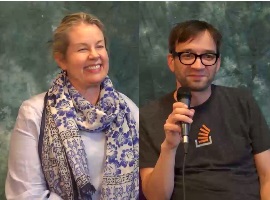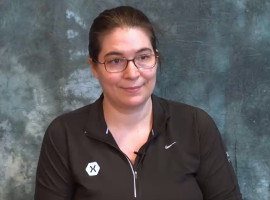InfoQ Homepage Conferences Content on InfoQ
-
Chris Young and Kate Gray on Winning Hearts and Minds of People
Chris Young and Kate Gray talk about applying methods used in political campaigns and the workplace to achieve goals, influence and engage people, and win their hearts and minds. They discuss how to create a vision that people can easily understand and will want to support, and how to get interaction and relevant feedback that helps deliver value.

-
Interview with Simon Ritter on Java 9
Alex Blewitt talks to Simon Ritter at QCon London 2016 about Java 9, the impact that Jigsaw will have on developers, and Java on the Raspberry Pi along with the differences between the Azul JVMs and Open JDK.

-
Aviran Mordo Discusses Technical Leadership, DevOps and Distributed Computing
Aviran Mordo discusses the skills required for technical leadership, his thoughts on DevOps, and the journey WIX has taken when implementing a microservice-based architecture. Mordo suggests that although architects may not be able to code full-time, they must remain 'hands-on', and although many new techniques, tools and frameworks are currently emerging, care must be taken with evaluation.

-
Jeffrey Fredrick on Harsh Realities and Learning
Jeffrey Fredrick discusses how human psychology can work against successful agile adoption. He explains harsh realities like accepting being wrong where people don't like to be wrong and spotting mistakes from others while not seeing your own mistakes, and explores how you can squeeze out the learning in different situations and really learn from mistakes.

-
Rachel Reese on The Good and Bad of Microservices (with F#)
Rachel Reese on the challenges and benefits of using microservices at Jet. In particular how F# made it easier to refactor and maintain hundreds of microservices. The hard bit is the infrastructure.

-
Interview with Martin Thompson on High Performance Java
Alex Blewitt speaks to Martin Thompson at QCon London 2016 on his open-source high-performance networking stack Aeron, and how it avoids garbage collection delays for consistently low latency. Martin explains the use of the xadd processor instruction to avoid spinning wait loops and looks ahead to where CPU technology is heading in the future.

-
Peter Alvaro on Distributed Programming, CRDTs, LDFI
Peter Alvaro discusses some of the reasons that distributed programming is hard, Lineage-driven Fault Injection, static analysis to check deterministic behaviour, CRDTs, and much more.

-
Interview with Charles Humble on InfoQ and QCon
Alex Blewitt interviews Charles Humble on the origins of the QCon conferences and how he came to be chief editor at InfoQ. They also take a trip down memory lane about how the conferences and news site have grown into an international phenomenon.

-
John Willis on IT Burnout and Mismatch Between Organizational and Personal Values
John Willis (@botchagalupe) on IT burnout, mismatch between persons and organizations, and the cost for both of them. Also how Docker ecosystem works and the past, present and future of Docker.

-
David Riddoch on Bypassing the Kernel and Hypervisor for Network I/O, Solarflare, OpenOnload
David Riddoch explains how bypassing the OS kernel's networking stack can improve latency and throughput, networking with Solarflare and OpenOnload, hypervisor bypass, and much more.

-
Interview with Gil Tene on Hardware Transactional Memory
Gil Tene speaks to Alex Blewitt at QCon London 2016 on the upcoming support for hardware transactional memory in server-class Intel chips, and what it will mean for the JVM. Tene discusses what kinds of applications will benefit from speculative lock elision and increasing concurrency in the near future on multi-core server platforms.

-
Adrian Colyer on the Morning Paper and Reading Computer Science Papers
Adrian Colyer explains the motivation behind publishing the "Morning Paper" (a blog discussing Computer Science research papers) and mentions some of his favourite papers of the past year.
